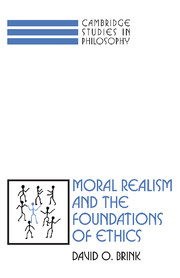Book contents
- Frontmatter
- Contents
- Preface
- 1 INTRODUCTION
- 2 MORAL REALISM AND MORAL INQUIRY
- 3 EXTERNALIST MORAL REALISM
- 4 DOES MORAL REALISM MATTER?
- 5 A COHERENTIST MORAL EPISTEMOLOGY
- 6 MORAL REALISM AND THE IS/OUGHT THESIS
- 7 A POSTERIORI OBJECTIONS TO MORAL REALISM
- 8 OBJECTIVE UTILITARIANISM
- Appendix 1 Must an infinite regress of justification be vicious?
- Appendix 2 Coherence, internalism, and externalism in epistemology
- Appendix 3 The is/ought thesis and intuitionism
- Appendix 4 Rawlsian constructivism
- Bibliography
- Index
6 - MORAL REALISM AND THE IS/OUGHT THESIS
Published online by Cambridge University Press: 11 January 2010
- Frontmatter
- Contents
- Preface
- 1 INTRODUCTION
- 2 MORAL REALISM AND MORAL INQUIRY
- 3 EXTERNALIST MORAL REALISM
- 4 DOES MORAL REALISM MATTER?
- 5 A COHERENTIST MORAL EPISTEMOLOGY
- 6 MORAL REALISM AND THE IS/OUGHT THESIS
- 7 A POSTERIORI OBJECTIONS TO MORAL REALISM
- 8 OBJECTIVE UTILITARIANISM
- Appendix 1 Must an infinite regress of justification be vicious?
- Appendix 2 Coherence, internalism, and externalism in epistemology
- Appendix 3 The is/ought thesis and intuitionism
- Appendix 4 Rawlsian constructivism
- Bibliography
- Index
Summary
Chapters 2 through 5 present a strong case for the individual plausibility and joint compatibility of moral realism and a coherentist moral epistemology. In this chapter I shall examine possible rebuttals based on arguments for and from the existence of an is/ought gap.
Most discussions of the is/ought gap concern its existence, not its implications or importance. Although nonnaturalists were happy to concede the existence of an is/ought gap, nonnaturalism is no longer thought respectable; most contemporary parties to the discussion seem to assume that the existence of an is/ought gap would in some way undermine the objectivity of ethics. One reason for thinking that an is/ought thesis would be inimical to moral realism has been quite influential: Noncognitivists have argued that the existence of an is/ought gap would undermine ethical naturalism and commit moral realism to an absurd kind of nonnaturalism, leaving noncognitivism as the only sane response to the existence of an is/ought gap. There are other, less well articulated worries about the compatibililty of moral realism with an is/ought gap, which I shall try to reconstruct: An is/ought gap can be thought to support both nihilism and skepticism. If any of these claims were true, the existence of an is/ought gap would undermine the metaethical views I have been defending.
I shall argue that these claims are false; the existence of an is/ought gap would undermine neither moral realism nor a coherence theory of justification in ethics.
- Type
- Chapter
- Information
- Moral Realism and the Foundations of Ethics , pp. 144 - 170Publisher: Cambridge University PressPrint publication year: 1989



